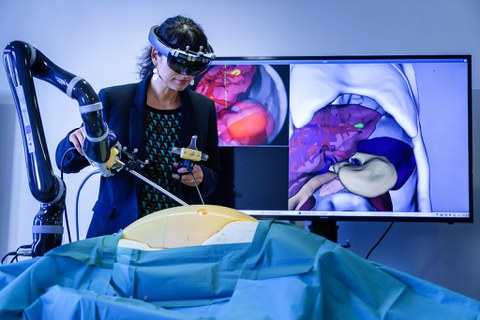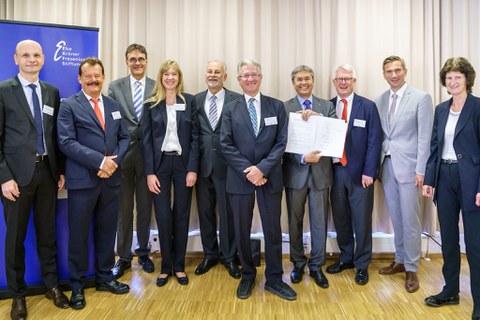Sep 04, 2019
Dresden creates ground-breaking interface between technology and medicine.
Contract is signed that launches the establishment of the "Else Kröner-Fresenius Center for Digital Health" / Foundation is supporting innovation over a 10-year period with 40 million euro
Representatives of the Else Kröner-Fresenius Foundation (EKFS), TU Dresden and the University Hospital Carl Gustav Carus Dresden signed the contract for the Else Kröner-Fresenius Center for Digital Health Dresden in the presence of the State Ministers for Research and Economics today (Wednesday, 4th September, 2019). Starting in September 2019, the foundation will provide a total of 40 million euro over ten years to support the establishment of innovative educational and organisational structures, interdisciplinary cooperation and the expansion of additional research resources. In March of this year, Dresden's concept was the winner in a nationwide EKFS competition. The aim of the center is to tap into the potential of digitalisation in medicine in order to improve patient care.
The center is a joint initiative of Dresden University Medicine, the Faculty of Electrical and Computer Engineering and the Faculty of Computer Science of TU Dresden as well as non-university partners. With its foundation, a new interdisciplinary center combining modern technology and medicine has been created on the Dresden campus. The common goal of the new center is to harness the potential of new communication technologies, robotics, sensor technology, new materials and artificial intelligence for the benefit of patients, to design them according to European standards and to ensure that experiences with these technologies are positive. A "Living Lab" will provide a practical framework for patient-orientated research. This is intended to significantly shorten the time it takes for innovations to be introduced into everyday care. For the center, an eHealth campus will be established directly on the premises of the University Hospital, where physicians and engineers will jointly learn, teach and conduct research for the first time with a direct and hands-on approach.
"The opportunities for innovative training and organisational structures, proven interdisciplinary cooperation and outstanding achievements in research were the reasons why the Else Kröner-Fresenius Foundation chose Technische Universität Dresden," explains Dr. Dieter Schenk, Chairman of the Board of Trustees of the Else Kröner-Fresenius Foundation. "Together, they culminate in better patient care, which was an explicit requirement of the call for proposals. The application from Dresden addresses one of the large future fields of medicine and in the final applications round was fully in line with the goals of the Else Kröner-Fresenius-Foundation ", emphasises Prof. Dr. Michael Madeja, Scientific Director of the EKFS. "This is where we see the greatest potential for establishing such a reform model for university medicine and for an internationally important research center".
"Today, much of our medical knowledge and clinical documentation is already digital. However, the benefits of digitalisation still go mostly unnoticed by patients and our colleagues in their daily medical work. As physicians, that was our motivation for seeking a new and improved exchange with TU Dresden's high-tech campus," says Prof. Dr. Jochen Hampe, gastroenterologist at the University Hospital in Dresden and spokesperson for the center. The center's scientists and doctors are united by a positive and participatory attitude towards technological progress in medicine. "We can only contribute our European values and our vision for patient-centred digital medicine of the future if we actively create it and lead the way with our innovations," says Prof. Dr. Hampe.
"We are proud of the trust placed in us by the foundation and thrilled by the opportunity to be able to set up the new 'Else Kröner-Fresenius Center for Digital Health' here in Dresden," stresses Prof. Dr. Hans Müller-Steinhagen, Rector of TU Dresden. "With the interdisciplinary combination of approaches from artificial intelligence, medical and sensor technology, digitalisation and patient-orientated clinical research, TU Dresden and the Carl Gustav Carus University Hospital were able to convince the foundation in the tough competition for this generous financial award. And with the new center, Dresden will become a European leader in this field of research", affirms the Rector. As in the Excellence competition, both the Carl Gustav Carus Faculty of Medicine and the technical and scientific excellence profile of TU Dresden made a crucial contribution to the success of the competition for the center. "The strategic development of the university's focal points and the successful acquisition of Clusters of Excellence both in the life sciences with the 'Center for Regenerative Therapies Dresden (CRTD)' and 'Physics of Life (PoL)' as well as in microelectronics and communication technology with the 'Center for Advancing Electronics Dresden (cfaed)' and the 'Center for Tactile Internet (CeTI)' have created the foundation for this new center," emphasises Prof. Müller-Steinhagen. "Above all, this interdisciplinary initiative is proof of the unique cooperative Dresden Spirit on campus, which made this pioneering and interdisciplinary initiative possible in the first place".
"The new center is both an opportunity and an obligation to bring scientists closer together from various disciplines, including non-medical ones, as we move forward. And it also offers the opportunity to strengthen Dresden's and Saxony's attractiveness as an internationally visible location for cutting-edge research in the ongoing process of attracting the best minds. These are important side effects," explains Science Minister Dr. Eva-Maria Stange. She emphasises: "For me, the main purpose of the new center is to allow doctors and engineers to collaborate in order to develop state-of-the-art diagnostic and therapeutic methods and utilise them at an early stage. In this way, they can be administered directly to patients as quickly as possible thereby enabling a significant improvement in medical care. The combination of research in medicine and in the technical and natural sciences as well as the direct link to patient care is unique and characteristic of Dresden’s excellence as a science hub."
"Digitalisation and health are two key issues facing us in the years to come. By combining them, great potential for growth arises. I am convinced that the Else Kröner-Fresenius Center in Dresden will grow into a leading location for innovations in the healthcare sector," says Economics Minister Martin Dulig. "'Biosaxony' and 'Silicon Saxony' as well as our rapidly growing software landscape offer just the right environment for our innovative technologies and products to emerge in the life sciences and innovative technologies and products for the market for health services – ‘Made in Saxony’."

Prof. Stefanie Speidel
The work of Prof. Stefanie Speidel from the National Center for Tumor Diseases Dresden (NCT/UCC) shows how the topics of digital medicine and digital health will play a vital role in the future. The computer scientist is developing new artificial intelligence methods for intraoperative assistance, for example for guidance during robot-assisted procedures. Based on her research, she hopes to be able to operate on patients more precisely and gently using robots. This innovation, developed in Dresden, makes use of augmented reality (AR). With this technology, surgeons can more easily identify the location and nature of a tumour during minimally invasive operations in the abdominal cavity and treat it in an even more targeted manner. The Helmholtz Zentrum Dresden-Rossendorf and the German Cancer Research Center as one of the supporters of the National Center for Tumor Diseases Dresden (NCT/UCC) are also contributing their expertise to the success of the Else Kröner-Fresenius Center for Digital Health with jointly financed projects. "We are already in the process of transcending the traditional boundaries between medicine, engineering and computer science and creating new interdisciplinary structures, physical proximity and joint training formats," says Stefanie Speidel. "This funding confirms our approach and offers us unique new opportunities."
The center's scientific agenda creates space for the application of new sensors and implants, networked medical workplaces and diagnostics, robotics and new procedures. At the same time, scientific infrastructure is being created. Key topics include data integration, security, patient benefits, implementation, ethics, regulatory affairs, teaching and the promotion of early career scientists. The promoting measures of the center will be competitive interdisciplinary innovation projects.
"We are creating the first truly integrated eHealth campus on the premises of a university hospital and are thus placing both practical and patient relevance right at the heart of our work," stresses Prof. Dr. Michael Albrecht, Speaker of the Board and CEO of the University Hospital Dresden. "This development is of central strategic importance for the University Hospital," adds Katrin Erk, Chief Financial Officer of the University Hospital. "In this way, we can attract the best and most creative minds, offer our colleagues the most modern workplaces and, above all, ensure that our patients have access to the best new diagnostic and therapeutic procedures at an early stage. "The Else Kröner-Fresenius Center for Digital Health will provide important momentum for developing treatments of the future," says Prof. Dr. Heinz Reichmann, Dean of the Medical Faculty of TU Dresden. "This center will shape the campus over the next few years and significantly improve our scientific competitiveness.
Contract signed in the presence of two State Ministers
The board of the Else Kröner-Fresenius-Foundation had announced a call for applications for funding totalling 40 million euro over ten years for a center for clinical research. In March 2019, Technische Universität Dresden's application for an "Else Kröner-Fresenius Center for Digital Health" was selected. The contract was signed on 4th September 2019 in the presence of Dr. Eva-Maria Stange, Saxon State Minister for Higher Education, Research and the Arts; Martin Dulig, Saxon State Minister for Economic Affairs, Labour and Transport; Chairman of the Else Kröner-Fresenius Foundation Dr. Dieter Schenk and board members Rudolf Herfurth and Prof. Dr. Michael Madeja on behalf of the foundation; Rector Prof. Dr. Hans Müller-Steinhagen and Dean of the Carl Gustav Carus Faculty of Medicine Prof. Dr. Heinz Reichmann on behalf of TU Dresden; Prof. Dr. Michael Albrecht, Speaker of the Board, CEO, and Katrin Erk, Chief Financial Officer, on behalf of the University Hospital. This marks the start of funding for the center in September 2019.
Media inquiries:
Else Kröner-Fresenius Foundation
Bianka Jerke
Press and Public Relations
Tel.: 06172 8975-24
Technische Universität Dresden
Press Office
Tel.: 0351 463-32398

